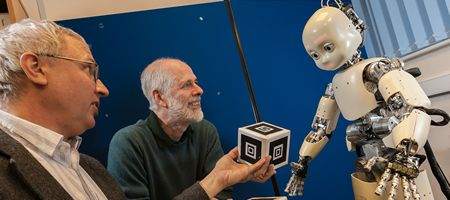The best way for robots to learn language could be the same way small children do – through interaction with adults.

Researchers at the University of Hertfordshire say they’ve given their iCub robot basic language skills as part of the iTalk project, using methods similar to those used to teach children.
Initially, the robot, named DeeChee, is programmed with around 40,000 English syllables, and can only babble and perceives speech as a string of sounds, rather than being divided up into words.
However, after engaging in a few minutes of ‘conversation’ with humans, in which the participants were instructed to speak to the robot as if it were a small child, the robot adapted its output.
It caught onto the most frequently heard syllables and started to repeat them, and was thus able to produce some word forms, such as the names of simple shapes and colours.
“It is known that infants are sensitive to the frequency of sounds in speech, and these experiments show how this sensitivity can be modelled and contribute to the learning of word forms by a robot,” says Dr Caroline Lyon.
Although the iCub robot is learning to produce word forms, it doesn’t know their meaning – and this will form the next stage in the iTalk project’s research.
The team hopes that its results could improve understanding of language development in human beings, as well as leading to robots that can speak and understand in a more natural way.
“This work shows the potential of human-robot interaction systems in studies of the dynamics of early language acquisition,” says Lyon.






